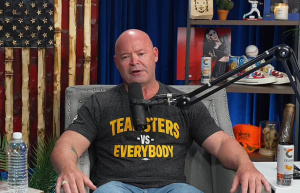Sean O'Brien, President of the Teamsters, has issued a rare public denunciation of the Democratic Party, accusing them of neglecting labor interests and losing union support, as evidenced by the union's lack of endorsement for Democratic nominee Kamala Harris.
Teamsters Leadership Breaks from Democrats Citing Long-Standing Grievances

Teamsters Leadership Breaks from Democrats Citing Long-Standing Grievances
Teamsters President Sean O’Brien condemns Democrats, questions allegiance to working class in political reshuffle.
In a candid display of discontent, Teamsters President Sean O'Brien has openly criticized the Democratic Party for its weakened ties with labor unions, a relationship once considered foundational to their voter base. This critique emerged following the party's failure to secure an endorsement from the Teamsters union for Kamala Harris in the 2024 presidential race. O'Brien, in a surprising turn on Theo Von's podcast, lambasted Democrats for abandoning working-class priorities in favor of corporate influences, citing this as a major factor in their dwindling union allegiance. He boldly stated, "I'm a Democrat, but they have f—ed us over for the last 40 years," highlighting a sentiment echoed by a significant portion of Teamsters members now leaning toward Republican Donald Trump. This shift, marked by internal polling showing 60% support for Trump compared to Harris's 34%, underscores the sector's growing disenchantment with traditional Democratic stances.
Harris's poor union support, as reported by CNN, marks a critical setback for her campaign and raises concerns among Democratic leaders about the party's appeal to its historical voter groups. O'Brien's call for self-reflection within the Democratic Party rather than blaming union decisions emphasizes the systemic issues perceived by labor leaders. Interestingly, despite the financial disparity in union contributions—significantly favoring Democratic causes—O'Brien's comments signal emerging opportunities for Republicans to position themselves as advocates for working-class Americans. As Harris's team grapples with these challenges, the evolving political landscape hints at a pivotal shift, with labor unions re-evaluating their political alliances and opening paths for Republicans to redefine voter dynamics ahead of the 2024 election.
Harris's poor union support, as reported by CNN, marks a critical setback for her campaign and raises concerns among Democratic leaders about the party's appeal to its historical voter groups. O'Brien's call for self-reflection within the Democratic Party rather than blaming union decisions emphasizes the systemic issues perceived by labor leaders. Interestingly, despite the financial disparity in union contributions—significantly favoring Democratic causes—O'Brien's comments signal emerging opportunities for Republicans to position themselves as advocates for working-class Americans. As Harris's team grapples with these challenges, the evolving political landscape hints at a pivotal shift, with labor unions re-evaluating their political alliances and opening paths for Republicans to redefine voter dynamics ahead of the 2024 election.




















